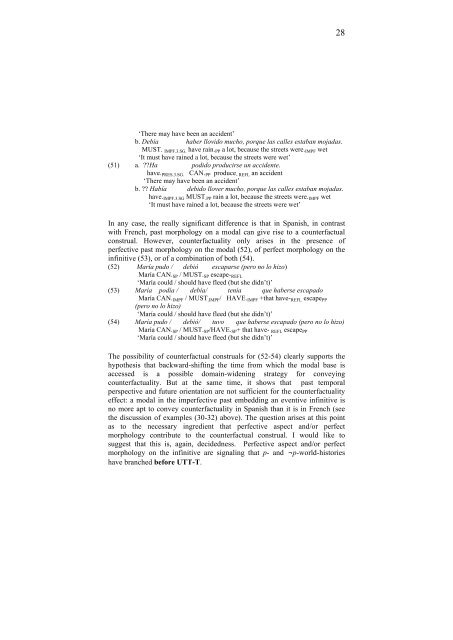On modal tenses and tensed modals - UMR 7023 - CNRS
On modal tenses and tensed modals - UMR 7023 - CNRS
On modal tenses and tensed modals - UMR 7023 - CNRS
You also want an ePaper? Increase the reach of your titles
YUMPU automatically turns print PDFs into web optimized ePapers that Google loves.
‘There may have been an accident’<br />
b. Debía haber llovido mucho, porque las calles estaban mojadas.<br />
MUST. IMPF.3.SG. have rain.PP a lot, because the streets were.IMPF wet<br />
‘It must have rained a lot, because the streets were wet’<br />
(51) a. ??Ha podido producirse un accidente.<br />
have.PRES.3.SG. CAN.PP produce- REFL an accident<br />
‘There may have been an accident’<br />
b. ?? Había debido llover mucho, porque las calles estaban mojadas.<br />
have.IMPF.3.SG MUST.PP rain a lot, because the streets were.IMPF wet<br />
‘It must have rained a lot, because the streets were wet’<br />
28<br />
In any case, the really significant difference is that in Spanish, in contrast<br />
with French, past morphology on a <strong>modal</strong> can give rise to a counterfactual<br />
construal. However, counterfactuality only arises in the presence of<br />
perfective past morphology on the <strong>modal</strong> (52), of perfect morphology on the<br />
infinitive (53), or of a combination of both (54).<br />
(52) María pudo / debió escaparse (pero no lo hizo)<br />
María CAN.SP / MUST.SP escape-REFL<br />
‘María could / should have fleed (but she didn’t)’<br />
(53) María podía / debía/ tenía que haberse escapado<br />
María CAN.IMPF / MUST.IMPF/ HAVE.IMPF +that have-REFL escapePP<br />
(pero no lo hizo)<br />
‘María could / should have fleed (but she didn’t)’<br />
(54) María pudo / debió/ tuvo que haberse escapado (pero no lo hizo)<br />
María CAN.SP / MUST.SP/HAVE.SP+ that have- REFL escapePP<br />
‘María could / should have fleed (but she didn’t)’<br />
The possibility of counterfactual construals for (52-54) clearly supports the<br />
hypothesis that backward-shifting the time from which the <strong>modal</strong> base is<br />
accessed is a possible domain-widening strategy for conveying<br />
counterfactuality. But at the same time, it shows that past temporal<br />
perspective <strong>and</strong> future orientation are not sufficient for the counterfactuality<br />
effect: a <strong>modal</strong> in the imperfective past embedding an eventive infinitive is<br />
no more apt to convey counterfactuality in Spanish than it is in French (see<br />
the discussion of examples (30-32) above). The question arises at this point<br />
as to the necessary ingredient that perfective aspect <strong>and</strong>/or perfect<br />
morphology contribute to the counterfactual construal. I would like to<br />
suggest that this is, again, decidedness. Perfective aspect <strong>and</strong>/or perfect<br />
morphology on the infinitive are signaling that p- <strong>and</strong> ¬p-world-histories<br />
have branched before UTT-T.

















